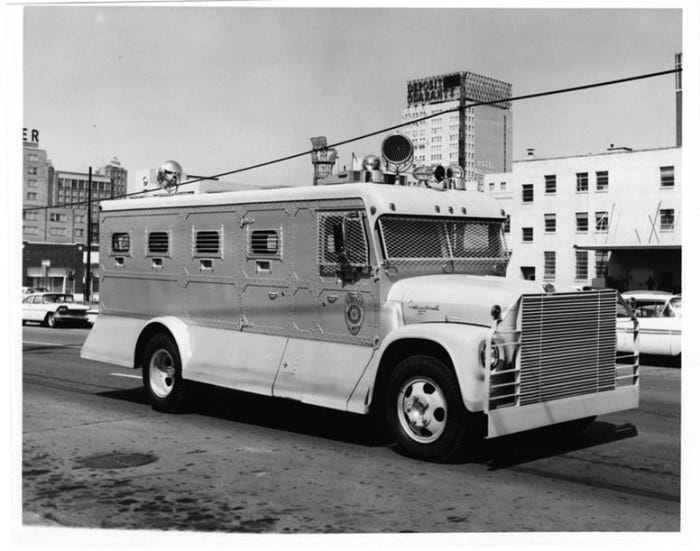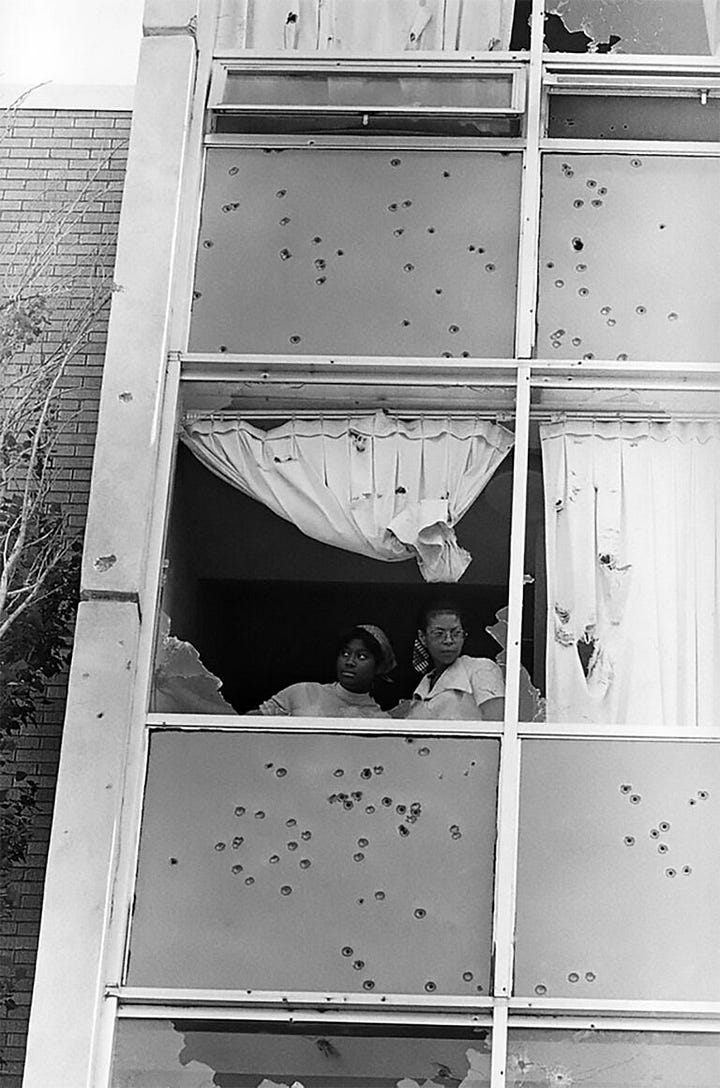This time of year, I survive mostly on tomatoes, cucumbers, and watermelons. I don’t eat them as a salad, but you can. I just eat them with salt. Fighting my way into Corner Market across from Duling School, I was intercepted by an army of tiny black people. They had a birthday party at Brent’s Drugs.
They don’t sell drugs at Brent’s Drugs. They sell hamburgers, egg salad sandwiches, milkshakes, and in a hidden room, finely crafted cocktails. My cocktails are generally not finely crafted. They’re one ingredient, some ice, and some memories. During prohibition, drug stores were where decent people went for a snort of cough medicine. Everybody else went across the river into Rankin County, which had a flexible definition of lawful behavior.
Black birthday parties weren’t always possible at Brent’s Drugs. That’s not casting aspersions on Mr. Brent. Had he tried to allow them, he would have had calls from night visitors determined to change his mind. My Daddy sometimes got calls from night visitors. So did some of his friends.
T.W. Lewis is an ordained minister, a decorated professor, one of the best athletes in the history of Millsaps College, and a remarkably gentle creature. He got a call from a night visitor once, making some very specific threats. Mr. T.W. and a friend spent the night on the porch with shotguns across their lap, with little Tom and little Catherine asleep on pallets on the floor. As grown-ups, Tom moved all the way upriver to Chicago to get the hell out of Mississippi. Catherine stayed.
Birthday parties at Brents Drugs aren’t cheap. This was a very upper-middle-class group of tiny black people. As fashionably dressed as nine-year-olds can get, one boy jealously guarded his tablet computer, avoiding talking to his classmates. We didn’t have tablet computers when I was nine. We had comic books, which were the same thing.
Despite orders from his momma to “follow her” and “look where you’re going” with his eyes on the tablet, he missed the curb going into the parking lot and took a tumble. He protected the tablet computer with his forearms. Standing up, he made sure his computer was working while his arms were clearly bleeding. Working on being a man, he didn’t seem to mind.
His mother cleaned the wounds with momma spit and a Kleenex. Momma spit can cure just about anything. They should try that first when there’s an amputation. Inside Brent’s, a teenage employee pops the balloon decorations. The children squeal with delight and false alarm. The idea that middle-class black families could pay a bunch of money for hamburgers and ice cream birthday parties in Jackson, Mississippi, seemed impossible when I was nine. I’m old, but that’s still a blistering rate of change, but only one you can see from this end. Going into the 1970s, you wouldn’t have expected it at all.
We called my mother’s mother “Nanny”. Nanny grew up named Brady in Learned, Mississippi. Learned is pronounced with two syllables. “Learn-Ed.” I don’t know why. Apparantly, there was once a Mr. Learn-Ed, but nobody knows his first name.
Jackson was a long buggy ride from Learned. Not quite as long as the one in “As I Lay Dying,” but you get the idea. There were doctors in Jackson, but not many, and no hospitals or infirmaries yet.
When Nanny was nine, her appendix became infected, then abscessed and burst. She would have died, but her body found a way to expel the poison out of her belly button. Her mother, who they called “Nanny,” cleaned the rancid puss from her belly button until it stopped coming, and fed my Nanny salty broth until she became strong again.
In her nineties, we moved my Nanny into a nursing home because we couldn’t care for her at home anymore. Toward the end, she started to call for me to take her home. Then she started to call for her Nanny to come take care of her. Her last words were for her mother to come and take the death away like she did when Nanny was nine. She did.
Your body wants to be healthy. It seeks ways to push the poison out of it. One time, I got a cyst on the back of my thigh to the side. Since I couldn’t see it, I couldn’t tell how bad it was getting. Finally, it started to get really sore, so I put some Neosporin on it, and by the end of the day, the abscess burst, leaking out a surprising amount of putrid stuff. It quit hurting, though.
In 1969, Mississippi was only worried about a few things. Beating the Russians to the moon. What happens when Archie Manning graduates, and what are we gonna do with all these negras?
The words we use to describe people from Africa who came here against their will are a movable feast. The idea of letting them choose what they want to be called is a fairly recent development. Before that, people went back and forth between trying not to offend and trying to be as offensive as possible.
My favorite word for them was “colored.” It even sounds friendly. When I was nine, everything that was colored was good. Color TVs, Coloring Books, color in your cheeks, colored socks, and Bic Pens with a choice of four colors based on what you click.
I was turning six in 1969. In Mississippi, rumors of something called “Burn Baby Burn” reached Jackson not long after I was born. The Mayor of Jackson was a man named Alan C. Thompson. His predecessor was a man named Leland Speed. I knew Mr. Speed, his wife, son, and grandsons. Even at six, I knew he had a reputation for being benevolent. He left his position as Mayor to develop an urban project near the Pearl River that he named “Eastover,” where we moved in 1969, so that the three-year-old girl could have her own room. I would share a room, but it had a divider, and the firstborn had his own room.
After centuries of crushing racism, in the 1960s, the colored people in Mississippi were rumored to be planning a massive riot to throw off Jim Crow for good. It was called “Burn Baby Burn,” and riots were allegedly planned all over America.
In a speech, Thompson, who had closed every public place for swimming in Jackson, rather than integrate them, said that the 1965 riots in Watts were just the beginning. 1969 would be the end of white rule in America, he predicted.
In 1969, Lyndon Johnson handed the Great Seal of Office over to Richard Nixon. Johnson had done more to equalize civil rights than anyone in United States history except for Lincoln. Nixon promised a return to “Law and Order,” promising to quell any black uprisings. One of Nixon’s principal operatives was a man named Roy Cohn. Donald Trump was Roy Cohn’s last protégé.
In the years to come, people would credit Richard Nixon for the Apollo 11 landing on the moon, but he’d only been president for six months. Prior to this, most Republicans demanded military control of NASA.
In 1969, I watched men land on the moon on the color television in our new home in Eastover, sitting at my mother’s feet, the three-year-old girl curled up next to her father, unable to stay awake for it all. I was very awake.
In 1963, Mississippi School Supply Company still sold school buses, although I should say we brokered them, because we never had an inventory of buses. My Uncle had been a close friend and ally of Leland Speed. My father, who took over from my uncle, had less-than-friendly relations with Alan C. Thompson.
Thompson wanted a school bus. He had a plan for dealing with Burn Baby Burn. Daddy insisted we couldn’t help, but directed Thompson to someone who could.
Starting with a barely used school bus, Thompson had armor plating and gun ports welded to the sides and solid rubber tires. Buses are built to carry a full capacity of healthy teenagers, but this one strained under the weight of the armor.
Dubbed “Thompson’s Tank,” the vehicle made its debut in 1964 to quell a “black uprising” at Jackson State. The operation was considered a failure when a tear gas canister exploded inside the tank, forcing the Jackson Police to abandon it.
Ten months after we landed on the moon. Russell C Davis, the new mayor, responded to calls about supposed riots, again at Jackson State University. The riots were a mostly peaceful protest until the Jackson Police Department forces showed up. When it was all said and done, twelve young colored students were shot, and two were dead. Davis shared feelings of guilt about this long after he was no longer mayor and spent most of his days tending his beehives.
This week, riots again broke out in Los Angeles. Riots are the body politic’s way of expelling infectious poisons from itself. Stephen Miller, working for Donald Trump, demanded that ICE agents double their number of daily deportations, specifically ordering them to pick up people at Home Depot. The LA protests began at Home Depot.
Mexicans looking for work at a Home Depot is a racist cliche, but it’s also true. Saying Mexicans are dangerous criminals but then trying to arrest them, looking for day jobs cleaning yard debris at Home Depot, should be incongruent, but not to the MAGA faithful. It makes just as much sense as the people in Jackson who cheered on Thompson sending a tank into Jackson State University.
All living things seek to preserve themselves. They find ways to expel poison from them, and, when they are threatened enough, they fight back.
I don’t know how much more peacable you can get than guys looking for work at Home Depot, frying tortillas at Taco restaurants, or attending their little girl’s graduation from the sixth grade. I know who started this fight. They’re not Mexican.
I’ve been listening to speeches by Ronald Reagan a lot lately. My feelings about Reagan are complicated, possibly more complicated than my feelings about my own father. Reagan had ideas about immigration that strike me as far more christian than those of either Donald Trump or Gavin Newsom. I’ve been desperately trying to figure out what Jesus wants of me in days like this. When he lived in days like these, they killed him.
“Father, take this cup from me.” He said.
A little black boy went to a birthday party in Jackson, Mississippi. He fell. His momma nursed him back to health with spit and a Kleenex. By now, he’s forgotten it, and she’s forgotten it. A whole new bunch of people gather at Brent’s today for a new lunch that’s still hamburgers and ice cream.
They’ve forgotten it, but it opened a great hall of windows and doors and memories and hopes and fears for me. Father, have you forsaken me? Have you forsaken them?
I don’t pray well. Most of them go something like “Hey. You know what I need. What do you need from me?”
Change does come. You can’t see it from the front end, though. Only the back end, and not always then. A little black boy fell down in a very white part of town. His momma healed him with momma spit and Kleenex.





